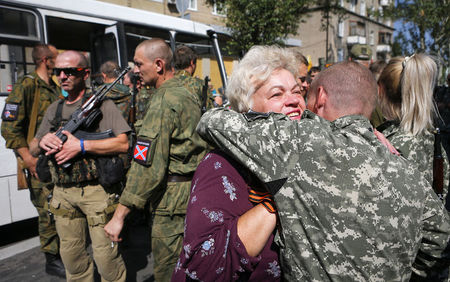By Richard Balmforth
KIEV (Reuters) - Ukraine accused Russia on Monday of sending soldiers across the border to open a new front in the separatist war that has devastated the east of the country and provoked the gravest East-West crisis since the fall of communism.
The charge, dismissed by Moscow, dealt a blow to already slim hopes of progress at talks on Tuesday towards ending the conflict between pro-Russian rebels and Ukrainian troops, in which more than 2,000 people have been killed.
Ukrainian President Petro Poroshenko, who is due to meet Russia's Vladimir Putin in the Belarussian capital of Minsk, expressed "extraordinary concern" at the Russian move, his press service said, setting the scene for a possibly angry encounter.
The Ukrainian military said a group of Russian forces, in the guise of separatist rebels, had crossed into south-east Ukraine with 10 tanks and two armoured infantry vehicles. It said border guards had halted the column outside Novoazovsk, Ukraine's most south-easterly point on the Azov Sea.
"This morning there was an attempt by the Russian military in the guise of Donbass fighters to open a new area of military confrontation in the southern Donetsk region," military spokesman Andriy Lysenko told journalists.
Donbass is the name given to the industrialised and mainly Russian-speaking east of Ukraine, where two regions -- Donetsk and Luhansk -- have declared independence from Ukraine in an attempt to join Russia.
Lysenko later added that two tanks in the column had been destroyed and several members of "an intelligence-sabotage group" had been seized.
"The area is now blocked by Ukrainian troops," he said.
BREAKTHROUGH UNLIKELY
With the rebels largely encircled in the cities of Donetsk and Luhansk, Ukraine has been pressing its advance while its Western allies have waited nervously to see if Moscow will intervene to prevent the separatists being crushed.
Russian Foreign Minister Sergei Lavrov, asked about the alleged incident, said "I have not heard of this, but there is plenty of disinformation out there about our 'incursions'."
NATO said last week that Russian forces had been firing artillery both within Ukraine and across the border, but Moscow has consistently denied taking part in the fighting or supplying weapons to the separatists.
The latest round of accusations and denials made it even more unlikely that any breakthrough can emerge from Tuesday's talks in Minsk, where Poroshenko and Putin will meet for the first time since early June.
Also taking part will be senior officials from the European Union, which along with Washington has imposed sanctions on Russia for what they criticise as its failure to rein in the separatists. Russia has hit back by banning most Western food imports.
Lavrov repeated Russian calls for a ceasefire and talks between all sides in Ukraine, saying the West should not put all the onus on Moscow.
"I hope very much our Western colleagues... won't just come with expectations we will somehow magically solve things for them. That will not work," he told a news conference.
With Russia blaming the crisis on Ukraine's military offensive and Ukraine refusing to pause its advance until Russia curbs the rebels, the chances of any progress were already looking bleak.
Further complicating the picture, Lavrov said Russia planned to dispatch a second convoy of humanitarian aid to relieve the plight of civilians in eastern Ukraine.
When a first convoy of more than 200 trucks crossed the border without Kiev's permission last week, Ukraine's state security chief denounced it as "a direct invasion".
Poroshenko, in a phone conversation with European Council President Herman Van Rompuy on Monday, expressed "extraordinary concern" at the movement of Russian military equipment across the border though he did not mention Russian soldiers.
His press service quoted him as expressing great disquiet also at "Russia's intention of sending a second so-called humanitarian convoy to Ukraine". He asked Van Rompuy to take joint steps "to stop the war in the centre of Europe".
MILITARY THRUST
The separatist rebellions erupted in Ukraine's mainly Russian-speaking east in April, two months after street protests ousted a Moscow-backed president in Kiev, replacing him with a pro-Western government.
Russia responded by annexing Ukraine's Crimea peninsula, and Putin spoke of its right to defend the interests of Russian-speakers in Ukraine.
The new military thrust - whether it is by separatist rebels alone or with the aid of Russian soldiers - might be aimed at capturing Mariupol, a government-held port city on the Azov Sea.
But military spokesman Lysenko said the main highway linking Novoazovsk to Mariupol, about 30 km (20 miles) west along the coastline, was still under the control of government forces.
"Novoazovsk has not been seized. The highway is under the control of forces of the anti-terrorist operation. We have enough resources in Mariupol itself to repel any attacks," he said.
Lyudmila, a resident of Novoazovsk who was reached by telephone, said: "Everything began at 8 o'clock this morning. Tanks appeared - no fewer than 7 of them, and Grads (rockets) and armoured vehicles."
She said the rebel forces had fired on Novoazovsk from the village of Markine, about 7 km (4 miles) away.
"Novoazovsk has died. People are hiding (from the shelling). We heard rumours of an invasion just a couple of days ago. The Ukrainian flag has been taken down on the city council offices," she said.

The commander of a Ukrainian national guard unit in the area near Novoazovsk where the fighting was reported told Reuters by telephone: "A war has broken out here." He said he could not speak and ended the conversation.
(Additional reporting by Pavel Polityuk, Alessandra Prentice and Lina Kushch in Ukraine and Katya Golubkova, Maria Tsvetkova and Gabriela Baczynska in Moscow; Writing by Mark Trevelyan; Editing by Tom Heneghan)
